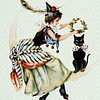Take a photo of a barcode or cover
adventurous
challenging
emotional
slow-paced
Interesting book. Gave some interesting information about C.S. Lewis and his background and how his interests were woven into his Narnia books. It was a nicely different viewpoint than books about Lewis by Christians/apologetics. Those of us who loved Narnia and appreciate Lewis's apologetic writings already know the Christian references, but it's a good counterpoint to read this author's view on the books. She was raised Catholic but stopped believing later on, but has reconciled her love of the books despite their Christian underpinnings. But sometimes it does get a little tiresome reading her atheistic viewpoint. Largely, however, it achieves its objective. The book explores some good alternate viewpoints and is academically sound. It is a bit like taking a good class on Lewis populated by non-Christians but who are all open to talking about the various opinions. This is the big drawback of the book, however, in addition to being somewhat of a strength: the reading is very slow-going and sometimes felt like a slog. You have to really be able to pay close attention because it can often feel like a dissertation. Overall, though, it's a source of good information and thought-provoking ideas.
Read my full review, including a rating for content, at RatedReads.com: https://ratedreads.com/magicians-book-narnia-clean-nonfiction-book-review/
Read my full review, including a rating for content, at RatedReads.com: https://ratedreads.com/magicians-book-narnia-clean-nonfiction-book-review/
Laura Miller's literary critique of the Chronicles of Narnia is wonderfully readable and hit upon so many of the points I've wrestled with as a reader who loved the books as a child but found the proselytizing irritating as an adult.
challenging
informative
slow-paced
A very insightful book that meshes about 95% with my own feelings about CS Lewis and the Narnia books. At first I was going to give it the full 5 stars, but some of the material, although very interesting, strayed a bit from the original premise.
Also, I still think The Last Battle is awesome, but I've always loved the ends of things.
Also, I still think The Last Battle is awesome, but I've always loved the ends of things.
When you pick up a book titled The Magician's Book: A Skeptic's Adventures in Narnia, you probably assume it will be about one person's experience with The Chronicles of Narnia. Laura Miller fulfills that expectation to some degree, but this book is balanced between being an exploration of personal responses to Narnia and a biography of C. S. Lewis.
Miller talks to a good handful of people about Narnia and relates their responses; these bits are sprinkled throughout The Magician's Book. That's readable enough. It's not really what I was looking for in the book, but I still enjoyed it. In the first section of the book, Miller explains how The Chronicles shaped her view of literature, and later, how her recognition of the Christian symbolism involved reshaped her view of The Chronicles, and that's sort of what I expected. I'm glad the book was not entirely about that, though, because it wasn't as fascinating as the title made me think it would be.
Where The Magician's Book makes itself worthwhile, for me, is in the half (roughly) of the book that's devoted to C. S. Lewis's life, his motives for writing The Chronicles, and his friendship with J. R. R. Tolkien. It's somewhat dry at times -- not horribly so, just enough to be noticed -- but interesting most of the time, so I sort of half-glazed over the dry parts and still ended up learning a lot. Despite my laziest intentions!
Note: I had to return this to the library last month, so my recollection of where things are located in the book's layout may be a little fuzzy.
(three-and-a-half stars)
Miller talks to a good handful of people about Narnia and relates their responses; these bits are sprinkled throughout The Magician's Book. That's readable enough. It's not really what I was looking for in the book, but I still enjoyed it. In the first section of the book, Miller explains how The Chronicles shaped her view of literature, and later, how her recognition of the Christian symbolism involved reshaped her view of The Chronicles, and that's sort of what I expected. I'm glad the book was not entirely about that, though, because it wasn't as fascinating as the title made me think it would be.
Where The Magician's Book makes itself worthwhile, for me, is in the half (roughly) of the book that's devoted to C. S. Lewis's life, his motives for writing The Chronicles, and his friendship with J. R. R. Tolkien. It's somewhat dry at times -- not horribly so, just enough to be noticed -- but interesting most of the time, so I sort of half-glazed over the dry parts and still ended up learning a lot. Despite my laziest intentions!
Note: I had to return this to the library last month, so my recollection of where things are located in the book's layout may be a little fuzzy.
(three-and-a-half stars)
Story: 3/5 She felt betrayed when she realised Narnia can be seen as a biblical retelling.
Characters: 3/5
Writing: 2/5 Not every subject is neatly captured in one chapter and it randomly reappears in another chapter.
Reread: Nope.
Characters: 3/5
Writing: 2/5 Not every subject is neatly captured in one chapter and it randomly reappears in another chapter.
Reread: Nope.
This was a fascinating read, well-written, interesting, and very helpful as I tried to explore my own opinions about Lewis and his books.
Now, if you are primarily a fan of Lewis for his Christian apologetics, this probably isn't the book for you. However, if (like me) you loved Narnia as a child but found yourself looking kind of askance at some aspects of it when you read it with your kids - this is a must-read!
The author is not a Christian, and so she isn't primarily exploring the Christian themes in Narnia or Lewis's other work. What she does do is examine her childhood love for Narnia, and the sense of betrayal she felt when as a teenager she realized it had all the Christian symbolism that it does, and her coming back to terms and ultimately embracing her love for the series and its world. In so doing she explores how children read books vs. how adults read books (and how we get from there to here), how world-creation happens, Lewis's bio and friendships with other writers, including Tolkien, the Medieval world view, and Romance, Fairy-tale and Allegory. It was a bit of a literary education all by itself. She had some great interviews with writers who both loved and hated Lewis - Pullman, Neil Gaiman, Jonathan Franzen, and others. It was a fascinating book. I'm glad I read it.
Now, if you are primarily a fan of Lewis for his Christian apologetics, this probably isn't the book for you. However, if (like me) you loved Narnia as a child but found yourself looking kind of askance at some aspects of it when you read it with your kids - this is a must-read!
The author is not a Christian, and so she isn't primarily exploring the Christian themes in Narnia or Lewis's other work. What she does do is examine her childhood love for Narnia, and the sense of betrayal she felt when as a teenager she realized it had all the Christian symbolism that it does, and her coming back to terms and ultimately embracing her love for the series and its world. In so doing she explores how children read books vs. how adults read books (and how we get from there to here), how world-creation happens, Lewis's bio and friendships with other writers, including Tolkien, the Medieval world view, and Romance, Fairy-tale and Allegory. It was a bit of a literary education all by itself. She had some great interviews with writers who both loved and hated Lewis - Pullman, Neil Gaiman, Jonathan Franzen, and others. It was a fascinating book. I'm glad I read it.
informative
reflective
slow-paced
Highly recommended to anyone who loved the Chronicles of Narnia as a child, and who as an adult found in them much to dislike. Miller doesn't solve the ambivalence, but her exploration of the books, and her anecdotes of her own complicated responses to them, are great reading. This is pretty terrific.






